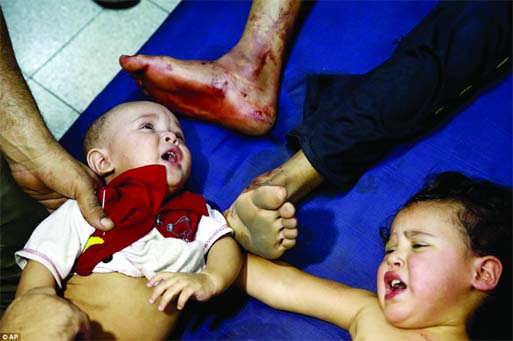
News desk :
The UN Human Rights Council voted to launch an inquiry into the ongoing Israeli offensive’s alleged violations of international laws.
Most of Thursday’s casualties were reported in the town of Khan Younis in southeast of Gaza, but ambulances struggled to enter the area amid intense fighting between Israeli troops and Palestinian Hamas fighters, Al Jazeera’s correspondent reported.
Navi Pillay, the UN rights chief, told an emergency session of the council on Wednesday that Israel’s military actions could amount to war crimes.
The 47-member council adopted the investigation under a draft resolution after a request by Palestine, which has UN observer status.
The death toll in Gaza reached 750 on Thursday as Israeli tank fire and pre-dawn assaults killed 35 more people in the Hamas-dominated coastal enclave, including an 18-month-old baby and six members of the same family, Palestinian officials said.
In southern Khuzaa and Abassan villages, they said, Israeli shelling left dead and wounded under rubble, while medical crews could not risk approaching. Elsewhere in Gaza, a UN aid agency said three of its teachers were killed in Israeli air strikes.
Israel has lost at least 32 soldiers in clashes inside Gaza and with Hamas. The military confirmed there had been a new clash on Thursday but did not immediately publish casualties.
UN humanitarian chief Valerie Amos has expressed extreme concern at the situation in Gaza, describing a ceasefire as “vital”.
She said the conflict meant 44% of Gaza was a no-go area for Palestinians, and residents were running out of food.
Speaking on Thursday, Valerie Amos said: “We have over 118,000 people now who are sheltering in UN schools… people are running out of food. Water is also a serious concern.”
The situation in Gaza was “terrible” and “dire”, she added.
Meanwhile, the US Federal Aviation Authority lifted a ban on US airlines flying into Tel Aviv, which came into force on Tuesday after a rocket landed about a mile (1.6km) away from Ben Gurion airport
However, several European airlines have continued to avoid landing in Tel Aviv.
Wednesday saw a flurry of diplomatic activity, with John Kerry, US secretary of state, holding meetings with Benjamin Netanyahu, Israeli prime minister, and Palestinian President Mahmoud Abbas.
However, hopes of a ceasefire appeared to be in deadlock.
In his first comments since the Israeli invasion, Khaled Meshaal, the Hamas political leader, said in Doha, Qatar, on Wednesday that his group would never accept a ceasefire plan that did not offer the ending of the Israeli blockade of Gaza.
The Israelis have said they will not accept a ceasefire that included an agreement on the blockade, and want a two-step solution – a ceasefire, then talks on any easing of restrictions.
Hours before the UN vote, Pillay told the emergency session that there was a “strong possibility” that Israel had violated international law in Gaza, “in a manner that could amount to war crimes”.
She said the killing of civilians in Gaza, especially children, raised concerns over Israel’s precautions and respect for proportionality.
Pillay also criticised rocket attacks into Israel by Hamas.
“Once again, the principles of distinction and precaution are clearly not being observed during such indiscriminate attacks on civilian areas by Hamas and other armed Palestinian groups,” she said.
The resolution lodged with the UN rights council by Palestine condemned “the widespread, systematic and gross violations of human rights and fundamental freedoms”.
It called on the international community to “urgently dispatch an independent, international commission of inquiry” to investigate “all violations of international human rights law” in the occupied territories.
The aim, it said, was to “establish the facts and circumstances of such violations and of the crimes perpetrated and to identify those responsible … ensuring that those responsible are held accountable, and on ways and means to protect civilians against any further assaults”.

